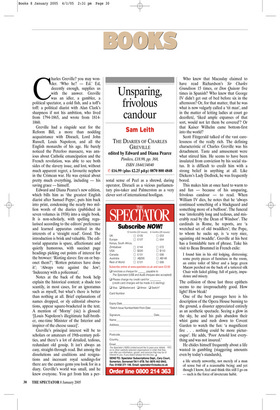Unsparing, frivolous candour
Sam Leith
THE DIARIES OF CHARLES GREVILLE edited by Edward and Diana Pearce Pimlico, £18.99, pp. 368, ISBN 1844134040 V £16.99 (plus £2.25 p&p) 0870 800 4848 Charles Greville? you may wonder. ‘Who he? — Ed.’ Ed, decently enough, supplies us with the answer. Greville was an idler, a gambler, a political spectator, a cold fish, and a toff’s toff: a political diarist with Alan Clark’s sharpness if not his ambition, who lived from 1794-1865, and wrote from 18141860.
Greville had a ringside seat for the Reform Bill, a more than nodding acquaintance with Disraeli, Lord John Russell, Louis Napoleon, and all the English monarchs of his age. He barely noticed the Peterloo massacre, was anxious about Catholic emancipation and the French revolution, was able to see both sides of the slavery issue, and lost, without much apparent regret, a favourite nephew in the Crimean war. He was cynical about pretty much everything, including — his saving grace — himself.
Edward and Diana Pearce’s new edition, which bills him as ‘the greatest English diarist after Samuel Pepys’, puts him back into print, condensing the nearly two million words of the diaries (published in seven volumes in 1938) into a single book. It is non-scholarly, with spelling regularised according to the editors’ preference and learned apparatus omitted in the interests of a ‘straight read’. Good. The introduction is brisk and valuable. The editorial apparatus is spare, affectionate and quietly humorous, with succinct page headings picking out points of interest for the browser: ‘Rioting slaves: fire on or bayonet them?’; ‘Rotten potatoes have done it’; ‘Always vote against the Jew’; ‘Indecency with a policeman’.
Notes at the back of the book help explain the historical context; a shade too scantily, in most cases, for an ignoramus such as myself, but what’s there is better than nothing at all. Brief explanations of names dropped, or sly editorial observations, appear square-bracketed in the text. A mention of ‘Morny’ (sic) is glossed: ‘[Louis Napoleon’s illegitimate half-brother, one-time Minister of the Interior and inspirer of the cheese sauce]’.
Greville’s principal interest will be to scholars or amateurs of 19th-century politics, and there’s a lot of detailed, tedious, redundant old gossip. It isn’t always an easy, straight-through read. But among the dissolutions and coalitions and resignations and incessant royal sendings-for there are the cameo gems you look for in a diary. Greville’s world was small, and he knew everyone. You get from him a per sonal sense of Peel as a shrewd, daring operator, Disraeli as a vicious parliamentary piss-taker and Palmerston as a very clever sort of international hooligan. Who knew that Macaulay claimed to have read Richardson’s Sir Charles Grandison 15 times, or Don Quixote five times in Spanish? Who knew that George IV didn’t get out of bed before six in the afternoon? Or, for that matter, that he was what is now vulgarly called a ‘tit man’, and in the matter of letting ladies at court go decolleté, ‘liked ample expanses of that sort, would not let them be covered’? Or that Kaiser Wilhelm came bottom-first into the world?
Scott Fitzgerald talked of the vast carelessness of the really rich. The defining characteristic of Charles Greville was his detachment. Taste and amusement were what stirred him. He seems to have been insulated from conviction by his social status. It is difficult to credit him with a strong belief in anything at all. Like Dickens’s Lady Dedlock, he was frequently bored.
This makes him at once hard to warm to and fun — because of his unsparing, frivolous candour — to read. When William IV dies, he notes that he ‘always continued something of a blackguard and something more of a buffoon’. The funeral was ‘intolerably long and tedious, and miserably read by the Dean of Windsor’. The cardinals in Rome, he reports, are ‘a wretched set of old twaddlers’; the Pope, to whom he sucks up, is ‘a very nice, squinting old twaddle’. Greville at his best has a formidable turn of phrase. Take his visit to Beau Brummel in French exile:
I found him in his old lodging, distressing; some pretty pieces of furniture in the room, an entire toilet of Silver and a large green Macaw perched on the back of a tattered silk Chair with faded gilding; full of gaiety, impudence and misery.
The collision of those last three epithets seems to me irreproachably good. How light! How bleak!
One of the best passages here is his description of the Opera House burning to the ground, a disaster appreciated entirely as an aesthetic spectacle. Seeing a glow in the sky, he and his pals abandon their whist game and rush down to Covent Garden to watch the fun: ‘a magnificent fire . . . nothing could be more picturesque’. He adds, ‘Poor Arnold lost everything and was not insured.’ He chides himself frequently about a life wasted in gambling (staggering amounts even by today’s standards),
a life utterly unworthy, not merely of a man of sense but of a reasonable being; and yet though I know, feel and think this still I go on — such is the force of inveterate habit.










































 Previous page
Previous page